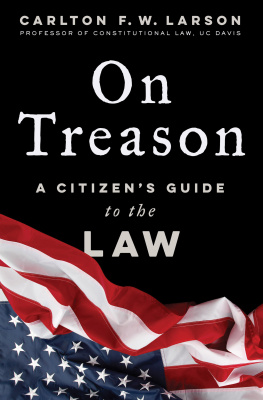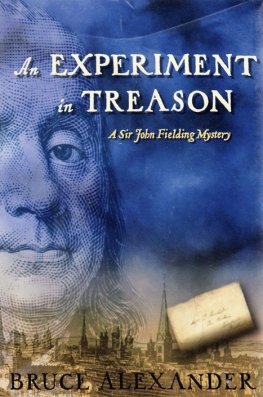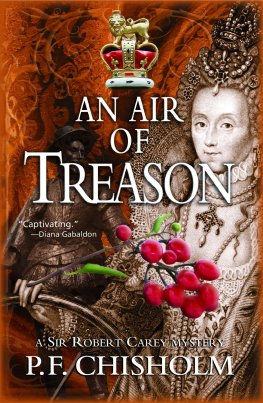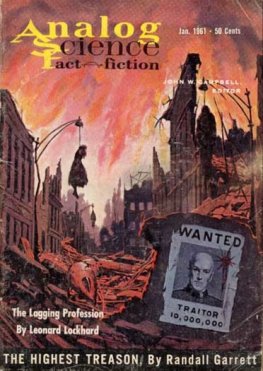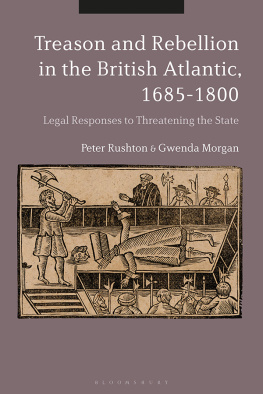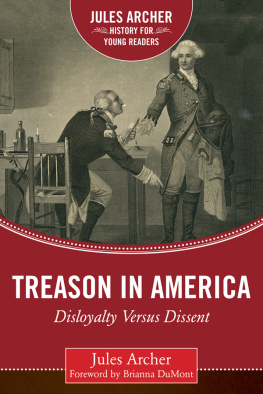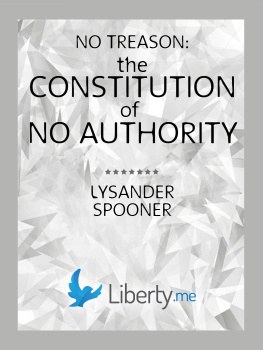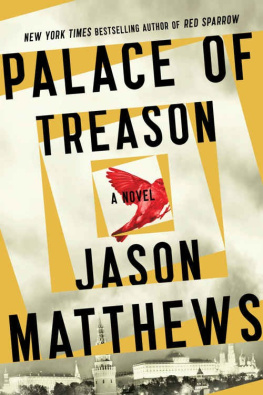Another story has just brokena plea for Russia to hack someones e-mails, a meeting at the Trump Tower with a suspected Russian agent, or an announcement by the president of the United States that a hated political enemy has committed treason. In my office at the UC Davis School of Law in California, I know what will come next. The phone rings, and suddenly I am back in the world of Washington, where I used to practice law. On the line is a reporter with the inevitable question: Is it really treason?
As recently as early 2016, I rarely received calls like this. As a professor of American constitutional law and legal history, I regularly answer questions for the media about legal issues. But for the most part, those calls tended to focus on constitutional law more generally and on other subjects I have written about, such as the Second Amendment or the arcane law governing baby names. Few people were interested in one of my primary fields of researchthe American law of treason.
Times have changedand dramatically so. Treason, for lack of a better word, is now hot again. Ever since Donald Trump publicly encouraged Russia to hack the DNCs e-mails, allegations of treason have hovered over Trump and his campaign, pushing the issue into a bright national spotlight. With each new sordid revelation, the stench of perceived disloyalty grows stronger. For many on the left, the notion that Donald Trump is a traitor isnt just a suspicion, its an established fact.
Trump, too, is convinced that widespread treason is occurring, although he sees different culprits. By June 2019, he had made at least twenty-four separate accusations of treason, far more than any other modern president.
But its not just Trump. If you look carefully, you can find accusations of treason everywhere; nearly every prominent politician has been accused of treason at some point, often in hysterical and breathless prose. From some of the less reputable corners of the internet, we learn, JUST IN: Chuck Schumer Just Got The WORST NEWS EVER!Treason Charges Probable...
W hat are we to make of this profusion of treason claims? Some of them are mere rhetorical hyperbole, a generic term for some perceived disloyalty. In casual conversation, for example, one might use the term traitor to describe a cheating spouse or a business partner hired away by a competitor. No one would interpret such a claim as referring to criminal activity.
Treason, however, also has a distinct legal meaning. Each nation defines treason differently, but the core concept is betrayal of ones country. In England and America, the law historically viewed treason as the most horrific crime a person could commit. Judges routinely described it as worse than murder, and the sentences imposed for treason bore this out. Whereas murderers were merely hanged, convicted traitors in England received a far more brutal and elaborate punishment. The culprit was drawn to the gallows behind a cart, and then partially hanged by the neck. While he was still alive, his entrails were taken out and burned in front of him, his genitals were cut off, and, finally, he was decapitated. His body was sliced into four pieces, which were then placed on stakes alongside the head in highly visible locations. It was believed, probably correctly, that this procedure would have a significant deterrent effect on all who witnessed it.
Many of the current allegations about treason, though, are not merely rhetoric, but sincere (although often incorrect) assertions that a person has committed a criminal offense. Such claims are made to encourage a prosecution, possibly leading to an execution or at least to a lengthy sentence of imprisonment. These allegations should not be tossed around lightly. To accuse someone of treason is to accuse him or her of the most significant offense known to American law.
But what exactly is treason? The answer would appear to be simplethe crime is specifically defined in the Treason Clause of Article III of the U.S. Constitution, which states, Treason against the United States, shall consist only in levying War against them, or in adhering to their Enemies, giving them Aid and Comfort. The language is clear and seemingly nontechnical. Why would a reporter, or anyone else, need to turn to an expert?
In reality, the Treason Clause turns out to be constitutional quicksand. In a 1945 decision, the United States Supreme Court warned that the Treason Clauses superficial appearance of clarity and simplicity... proves illusory when it is put to practical application. There are few subjects on which the temptation to utter abstract interpretive generalizations is greater or on which they are more to be distrusted. The little clause is packed with controversy and difficulty.
Supreme Court justices are not usually so candid about the difficulty of their cases. But controversy and difficulty is an entirely appropriate summary of American treason law, a field in which seemingly obvious intuitions are often wildly off the mark. The body of law surrounding treason is complex, contested, and often rooted in even more obscure strands of English law. As a result, there is usually no simple answer available on the internet or anywhere else.
Controversy, difficulty, and complexity, however, are not desirable qualities in a nations criminal law, which is supposed to provide clear notice as to what conduct is prohibited and what is not. The allegations about Donald Trump have greatly increased public curiosity about treason, but it is more difficult than it should be for interested citizens to find reliable information about the offense. Increasingly shrill accusations of treason on all sides of the political spectrum have done little to advance public understanding; indeed, they tend to muddy the issue far more than to clarify it. What is needed is a reliable overview of the American law of treason that everyone can understand.
On Treason has two broad goals. First, this book seeks to explain, in language clearly intelligible to nonlawyers, the core principles of American treason law, including many areas that are not widely understood. My intent is to arm the reader with the tools to identify what counts as treason and what does not in the vast majority of cases. Sometimes the question can be genuinely hard, because there are issues that havent been squarely resolved by courts, or because modern developments have challenged the factual assumptions underlying certain doctrines. In these cases, I have tried to lay out the arguments on both sides, recognizing that courts might resolve the issue either way. The
Second, the book relates the stories of significant treason cases in American history. Although treason trials are now a rarity, they have played an important role in our countrys development. Our very existence as an independent nation was formed in an act of treason against Great Britain. Our greatest national crisis, the Civil War, was triggered by the decision of Southern states to traitorously wage war against the United States. The stories of Benedict Arnold, Aaron Burr, Jefferson Davis, and others are fascinating, not just because of their colorful details, but because they illuminate fundamental aspects of our national identity.

